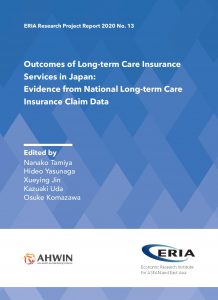RESEARCHERS
Nanako Tamiya, Professor, University of Tsukuba, Japan
Hideo Yasunaga, Professor, University of Tokyo, Japan
The goal of this study is to clarify the structural and procedural factors associated with the sustainment or improvement of residents’ care-need levels in long-term care facilities. Residents in long-term care facilities, day-service users, and day-care users will be included in this research. Statistical analyses will be carried out by combining national long-term care insurance claim data, vital statistics data, and a survey of institutions and establishments for long-term care for the period from September 2015 to March 2017.
The research will focus on detailed information about supplemental services and treatments to clarify their effect on the outcome of residents. In terms of statistical analysis, a multilevel logistic regression will be used to clarify facility effects after adjusting for the case mix of resident characteristics.
In order to ensure continuous improvement in the quality of long-term care, and to explain to those in ASEAN member states how Japanese long-term care services contribute to maintaining and improving the condition of service users, it is necessary to clarify structures and processes that contribute to the improvement of outcomes.
We expect that this research could facilitate evidence-based decision making for the Asia Health and Well-Being Initiative (AHWIN) launched by the government of Japan, which aims to promote regional cooperation to create vibrant and healthy societies where people can enjoy long and productive lives. The outcomes of this study will include (1) identifying long-term care providers that offer services that are helping to improve the outcomes of residents, (2)providing information about the services identified above that can be useful to caregivers and facilities in ASEAN member states, and (3) identifying key considerations on how to provide long-term care services in ASEAN member states.
This study will also include a literature review to describe factors associated with dependence level in terms of physical functions of residents in long-term care facilities, day-service users, and day-care users.
This study expects to offer evidence for policymakers both in Japan and ASEAN countries to make informed decisions on policies regarding long-term care systems and the respective populations using long-term care services with the goal of improving support for this vulnerable group. In particular, it will seek to determine what kind of services could be most effective for the realization of a healthy society.


